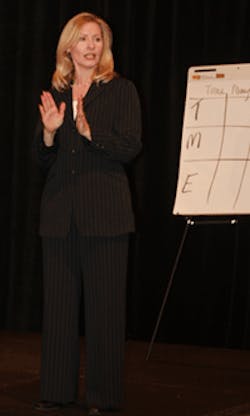HOUSTON — At the Quality Service Contractors’ Power Meeting XXXII held here, March 11-13, QSC attendees learned about the “entrepreneurial myth,” what can be done to build a successful business, and how effective leadership, personal empowerment and self-sufficiency all attribute to a prosperous business.
Making Your Business Work For You: The E-Myth Solution, a day and a half seminar based on E-Myth's proprietary solutions to create a strategic business vision and develop business leadership skills to make that vision a reality, began with Tricia Huebner, E-Myth business coach, discussing the entrepreneurial myth.
The entrepreneurial myth entails ideas that owning a business will free up time, and create more money and freedom and that knowledge of the technical work of the business equates to running a successful business, all of which are usually far from being true.
“Sometimes it’s better to open a business you know nothing about since you have to work ‘on’ it, not ‘in’ it,” explained Huebner. “Start thinking like an entrepreneur. This will help you focus on creating a successful business that can be run without you.
“Your business is a reflection of you,”added Huebner. “You need to take responsibility of things that are not working, which can be very challenging. You also need to decide what type of business you want to pass on. What would it be like to be free? To know what is going on in your business and that it’s working?”
Huebner delved into discovering strengths and weaknesses in seven vital areas of a business — leadership, marketing, money, management, lead generation, lead conversion and client fulfillment. Attendees learned about systemic thinking, a problem solving technique to reinforce the skill of managing a small business; dealing with immediate business frustrations and how to eliminate them and prevent their recurrence; developing the skill of systems-based thinking; identifying inaccurate perceptions of the business and revealing hidden opportunities; reducing problems and toxic work environments; and creating a culture that sees problems as opportunities.
Huebner also reviewed the three key perspectives to any business — entrepreneur, technician and manger. The technician likes to finish things, the manager likes order and control, and the entrepreneur likes to create and live in the unknown.
“Managers and entrepreneurs are more strategic, they put the business in place, so you need to be conscious of if you are working ‘on’ or ‘in’ the business,” saidHuebner. “A manager looks at how to build a system and do it better. They think about the present and immediate future, and also review past and present performances, and project the future.”
Attendees had the most questions about the manager component.
“There is a difference between a manager and supervisor,”Huebner told attendees. “A supervisor supervises people, and monitoring a person is more tactile. A manager deals more with processes.”
Innovation, focusing on making the current system better, was also discussed during the seminar.
“Every system has a result, a reason for being,” explained Huebner. “You need to figure out how you will measure the achieved system result. You need to figure out if the system in place is actually working. It’s important to write down these systems for an operations manual — this is the value of the business — how things are done.
“You also need to have system standards. How do you want people to behave? You need requirements — quantity, quality and behavior — for achieving the result and performing the work. You need consequences along with a probation and firing system too if people don’t follow systems. Consequences need to be in written policies.”
Huebner then discussed personal objectives, primary aim, and business vision, and how synergy is needed between all three.
“The primary aim is figuring out who you are and what makes you tick,” Huebner told attendees. “This is a brief statement that describes how you want to show up and live your life each and every day.”
A personal objective entails how you want to spend your personal time, according to Huebner, and business vision entails the ability to see the company you have today (the old company) and describe the company of your dreams (the new company).
Attendees also learned about thinking and speaking patterns that promote effective leadership, personal empowerment and self-sufficiency from Jim Bagnola, a certified stress-management instructor, specializing in the field of leadership and body-mind management, during the Becoming a Professional Human Being: Using the Secrets of the Mind and Body seminar.
Bagnola reviewed the difference between disempowering language and empowering language, and discussed how to manage worry and fear of the unknown. His presentation also touched on focusing on effectiveness and using enabling language.
John Izzo, author of “The Five Secrets You Need to Know Before You Die,” spoke to attendees during the seminar about his book, and during the Memory Skills seminar, Harold Mangum, the fastest memory instructor ever to be certified, presented memory techniques to help attendees recall important client information.
About the Author
Candace Roulo
Candace Roulo, senior editor of CONTRACTOR and graduate of Michigan State University’s College of Communication Arts & Sciences, has 15 years of industry experience in the media and construction industries. She covers a variety of mechanical contracting topics, from sustainable construction practices and policy issues affecting contractors to continuing education for industry professionals and the best business practices that contractors can implement to run successful businesses.
